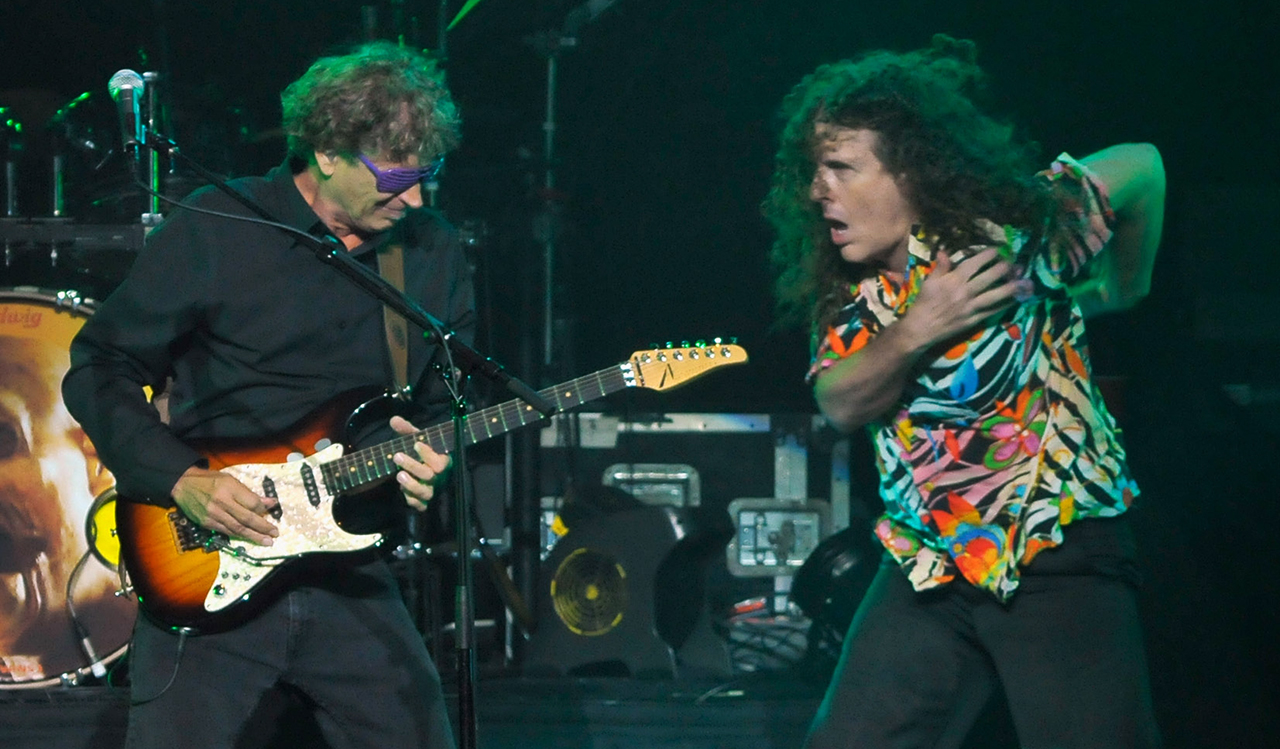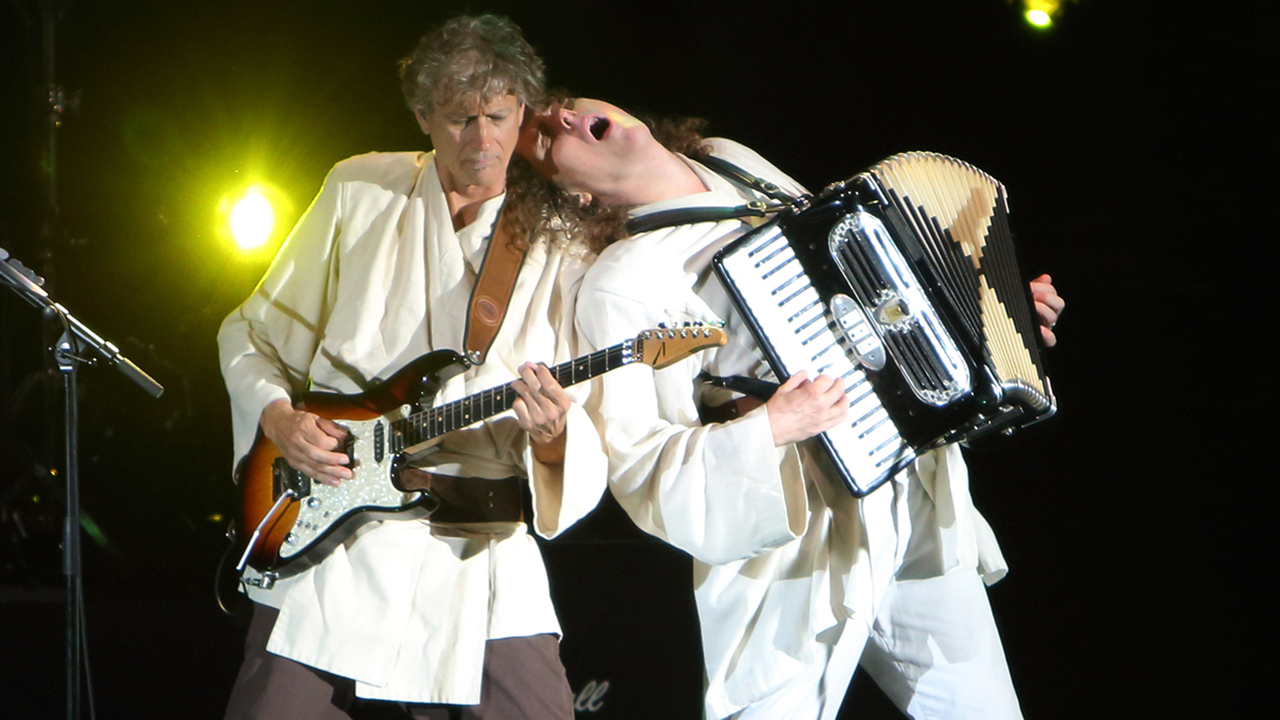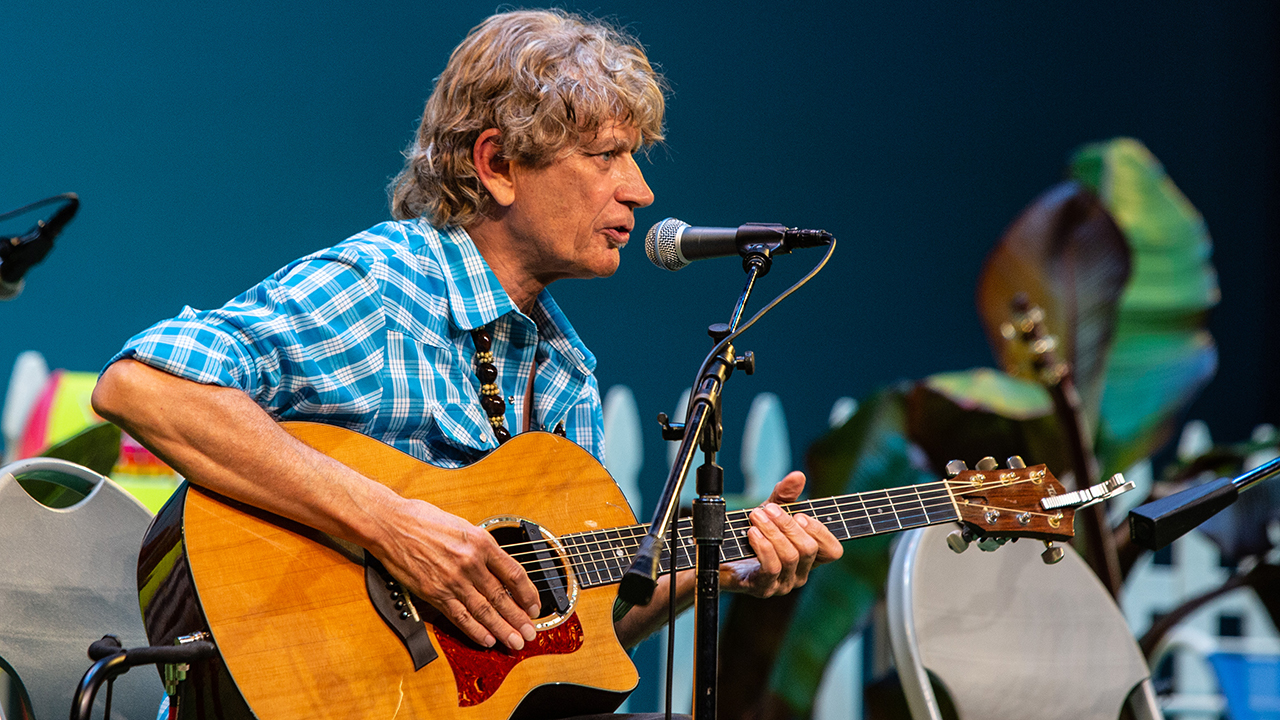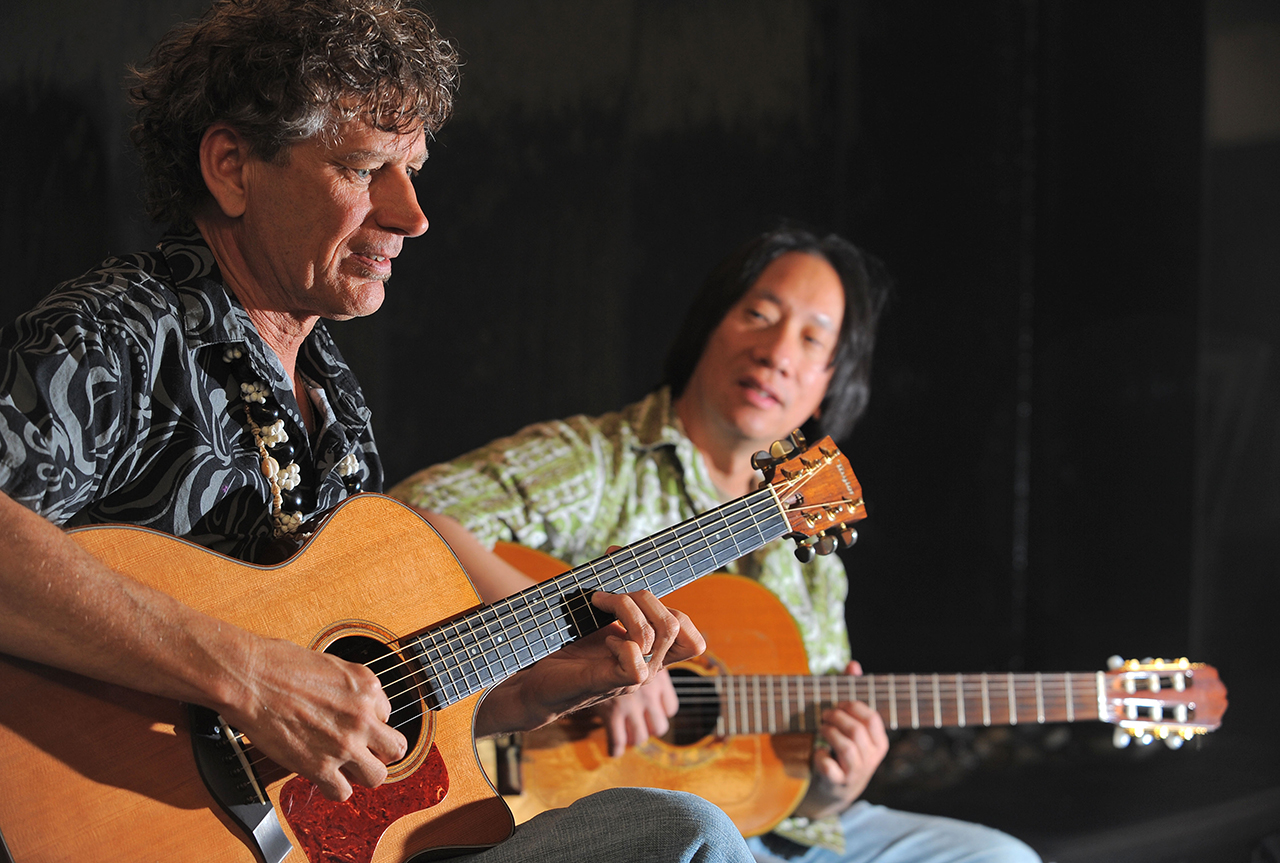
Outrageous antics, striking music videos and massive world tours have defined Weird Al since his earliest days as an accordion-slinging songwriter turned parody master.
Albums like Even Worse (1988), Off the Deep End (1992) and Bad Hair Day (1996) were memorable for their humorous takes on Michael Jackson, Nirvana and Coolio’s music.
Also memorable was the slick performance of Weird Al’s band, which, since 1983, has been anchored by Tampa, Florida-born Jim ‘Kimo’ West on guitar. His chilled-out vibe has been the perfect foil for Al’s larger-than-life persona. In fact, West is so laid back that he wasn’t bothered when Rick Derringer was hired to do most of the lead guitar work in the studio during the ‘80s.
And once the ‘90s kicked off, it was all West, all the time. “I’m grateful every day that I’ve made a living playing music,” he says. “Many people don’t have the blessing of finding what they love. By the time I was 17, I had decided this was what I would do. It’s been an amazing ride.”
In 1999, he launched his solo career with Coconut Hat. Eleven albums later, in 2019, Moku Maluhia: Peaceful Island received a Grammy nomination for Best New Age album, narrowly missing out. Two years later, 12th title More Guitar Stories did the job.
“Getting a Grammy was pretty darn up there,” West confirms. “But I’ve had so many great experiences – playing solo for 50 people; playing with Weird Al at Red Rocks with the Colorado Symphony for thousands. And next year, we’re going out with an expanded band. Extra players and singers. That’s going to be really cool!”
What got you started on guitar?
“I have a brother who’s 10 years older than me, and he used to noodle around on folk songs on guitar. He had a cheap acoustic, and when I was 12 it started to fascinate me. I picked up his guitar – I think it had three strings – and began noodling around on it.
“He saw that I was interested and bought a set of strings, a chord book and a capo. Once I had this thing strung up, I started learning chords; and every day I would play forever. It was just an immediate love.”
Once you got going, what sorts of sounds appealed to you?
“By the time I was 13 or 14 I started getting into rock ’n’ roll. I got an electric guitar but I didn’t have an amp. Somebody had turned this old transistor radio into something where you plug a guitar into it; they kind of overloaded the input, so it sounded like screaming distortion and feedback, which I loved.”
What was the Florida scene look like?
“I started playing professionally when I was 16, so I wasn’t going out to many bars. There were community centers and events that bands would play at, and I might have played some nightclubs, too. There was a healthy live scene – more so than nowadays.”
Frank Zappa said, ‘This is the best cover band I’ve ever seen.’ He took my number, though he never called me
Can you remember your first gig?
“It was at a festival; I remember being so nervous that my foot was shaking while I was using my wah pedal, which gave it this crazy warbling effect. After the gig, someone came up to me and said, ‘Wow! How are you getting that sound?’”
Why did you leave Florida for LA in the early '80s?
“I had a really good house band gig at this big nightclub – probably one of the best gigs you could get in Florida. I didn’t even need to bring my guitar home because I always had this gig. It was very popular with touring musicians who would come to town. One night Frank Zappa came in.

“Our band was very good, and when we talked to Frank afterward he said, ‘I think this is the best cover band I’ve ever seen.’ He took my phone number, though he never called me. He did call our bass player, Steve Jay, who went out to audition for Frank – but didn’t get the gig.
“Steve decided to stay out in LA. He met a band looking for a guitarist and hooked me up with them. My first gig was about three days after I got there, so I was working right away. It was a great way to move out there.
“About a year later, Steve recorded on Weird Al’s first album, then Al was looking for a guitar player because he wanted to do some live shows. I went in to audition – and I wasn’t even sure who he was!
“I learned some of his tunes and got the gig. We did some shows, and it just became a bigger and bigger thing where we wound up on tour buses – it snowballed.”
Were you into the parody thing at first?
“When I first learned his tunes, he had original songs along with the parodies. But in those days I just learned the parts without doing too much research. Once I started learning the songs, I appreciated them right away.
“Al is talented – he’s good at creating lyrics. He really works at it; I realized that the songs weren’t just thrown together. And once we started creating successful albums, things got more sophisticated.”
Even Worse – which included Fat, a parody of Micheal Jackson's Bad – was an ‘80s highlight. What gear did you use?
Al is talented… He really works at it; I realized that the songs weren’t just thrown together
“I used a lot of different things. We had a nice studio to record at in Santa Monica and I had a nice Marshall. Depending on the song, I had my own amps too. Fat has this funky rhythm part, and I recorded that direct into the console. I put a little compression on it, giving it a spanky sound, but there was no amp on it.”
Rick Derringer produced most of Weird Al’s early albums. Did he impact your direction much?
“Rick was fun; we got to be friends and hung out quite a bit. In fact, he went to B.C. Rich – who he was working with – and got me an endorsement. Rick would do a lot of the solos, and I’d play the rhythm parts through a B.C. Rich Mockingbird.
“Usually we’d use a Marshall JCM800 for the crunchy parts, and for the cleaner parts I’d use my Strat through some sort of Fender amp.”

Off the Deep End – with Smells Like Nirvana, another notable parody – was the first record Weird Al did without Rick. How did you approach that?
“By then I had a few different things, like a rack system; they were big in the early ‘90s. I had the rack system, several preamps and Mesa/Boogie cabinets. It was a really tweaked system, and I used that on most of that album.
“On Smells Like Nirvana I had this little Zoom processor, which gave me this gnarly sound. I ran that into a Marshall dialed to a clean setting. It was this unorthodox thing but it just seemed to work, so I went with it.”
Winning your Best New Age Album Grammy in 2021 must have been gratifying.
“My solo guitar stuff is based on Hawaiian slack-key, a traditional style that started in the 1830s. I started going to Hawaii in the mid ‘80s and I fell in love with that style. I mostly did it for myself – it’s just fun to play. I use a lot of open tunings, which I enjoy.
“I started writing my slack-key songs and somebody said I should put out a CD. I’d never considered it, but I put out a CD and started doing solo gigs – which was nerve-racking because I was used to playing in a band. When the first album came out it got some good press, so I said, ‘I’ll make another.’ And now I think I have 12 albums!
“I’d been a member of the Recording Academy for a long time, but I never thought I could enter my own CDs. I didn’t think there’d be a place for them – when the nominations came out, my phone was buzzing a whole lot!
I’m plugged into the Fractal and then it goes directly to the PA. It’s reliable, and the sound people love it
“Moku Maluhia: Peaceful Island was nominated but didn’t win. More Guitar Stories did, though it was during Covid. I was sitting in my studio with my laptop and a glass of wine, and when they called out my name I was like, ‘Wow!’ It was quite a shock!”
What does your current Weird Al touring rig look like?
“It’s about as simple as could be. I’ve been using a Fractal Axe-Fx for about 10 years. I had this complicated rack system, which was wonderful but required a lot of maintenance. All it takes is one plugin going wrong and you’ve got a problem. So I’ve been using Fractal.”

Does that mean you've done away with your signal chain?
“I’m plugged into the Fractal and then it goes directly to the PA. I just use the FX effects and some expression pedals. It’s reliable, and the sound people love it because nothing is coming off the stage to muddy up their mix. It’s made my life easier and the setup is quick.”
Weird Al’s last album, Mandatory Fun, came out in 2014. Are there plans for a follow-up?
“I don’t know. He really hasn’t put out an album since he finished his contract with Sony [RCA]. I think he’s happy not to be under the gun and have to put out records on a timetable – but he may be working on some new things. It wouldn’t surprise me.”
Are you working on your next solo record?
“I’m working on a collaborative record with Muriel Anderson, a harp guitarist who’s been around for a while. We started recording in January. And I’ve got an album with Joss Jaffee, a multi-instrumentalist. It’s a very chilled-out, world music record with a bit of Hawaiian slack-key in there. I always have something in the pipeline.”
- More Guitar Stories is on sale now.







